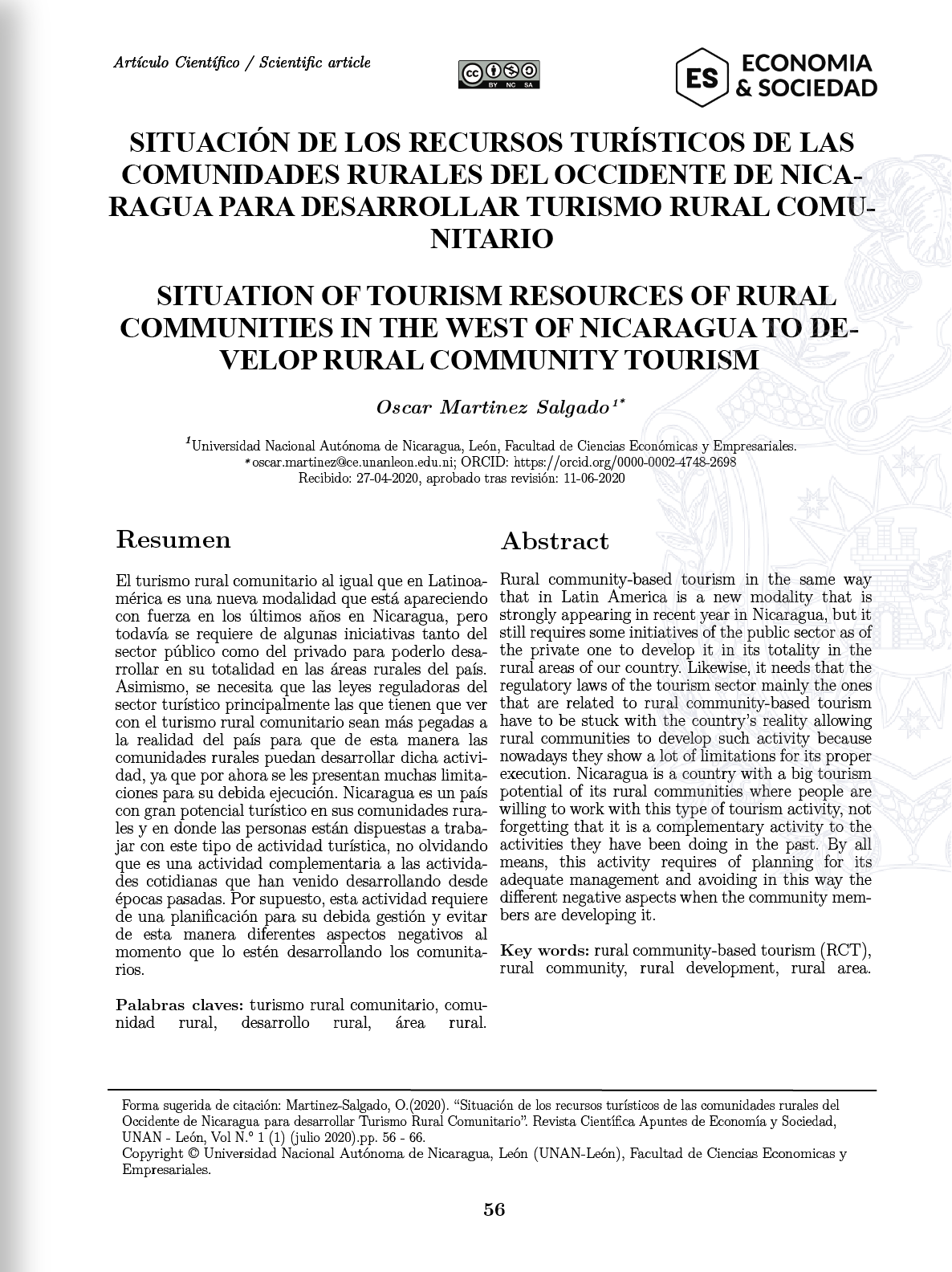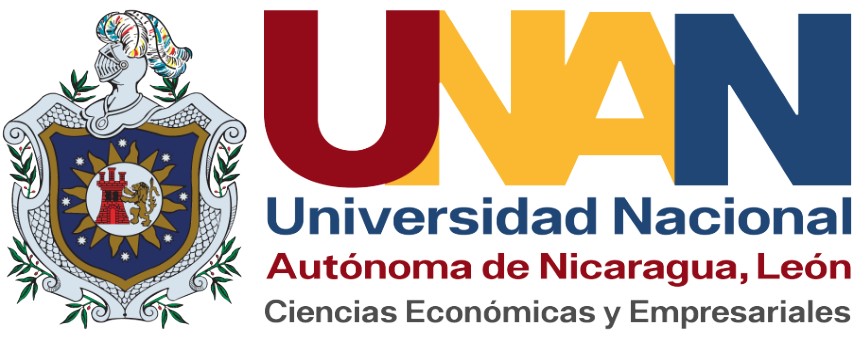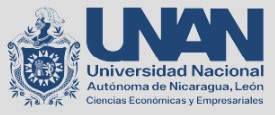Situation of tourism resources of rural communities in the west of Nicaragua to develop Rural Community Tourism
DOI:
https://doi.org/10.5377/aes.v1i1.11440Keywords:
rural community-based tourism (RCT), rural community, rural development, rural areaAbstract
Rural community-based tourism in the same way that in Latin America is a new modality that is strongly appearing in recent year in Nicaragua, but it still requires some initiatives of the public sector as of the private one to develop it in its totality in the rural areas of our country. Likewise, it needs that the regulatory laws of the tourism sector mainly the ones that are related to rural community-based tourism have to be stuck with the country’s reality allowing rural communities to develop such activity because nowadays they show a lot of limitations for its proper execution. Nicaragua is a country with a big tourism potential of its rural communities where people are willing to work with this type of tourism activity, not forgetting that it is a complementary activity to the activities they have been doing in the past. By all means, this activity requires of planning for its adequate management and avoiding in this way the different negative aspects when the community members are developing it
Downloads
References
ALBA SUD. (2019). Asociación Puesta del Sol (Nicaragua): turismo comunitario y empoderamiento de las mujeres. Citado en: http://www.albasud.org/noticia/es/1149/asociaci-n-puesta-del-sol-nicaragua-turismo-comunitario-y-empoderamiento-de-las-mujeres
Banco Central de Nicaragua BCN (2017). Nicaragua en cifras. Citado en: https://www.bcn.gob.ni/publicaciones/periodicidad/anual/nicaragua_cifras/nicaragua_cifras.pdf
Barrera, E. O., Bringas, H, Thome, M. y Villani. M. (2009). Materiales de curso postgrado en la alta dirección en turismo rural. Facultad de Agronomía, Universidad de Buenos Aires, Buenos Aires.
Bolwel, D. y Weinz, W. (2009). Reducir la pobreza a través del turismo, documento de trabajo, Organización Internacional del Trabajo, Ginebra.
Briedenhann, J. y Wickens, E. (2004). Tourism routes as a tool for the economic development of rural areas areas, vibrant hope or imposible dream. Turism Management, pp. 71-79.
https://doi.org/10.1016/S0261-5177(03)00063-3
Carmines, E. y Zeller, R. (1979). Reliability and validity assessment. Sage: London.
https://doi.org/10.4135/9781412985642
Cohen, J. y Cohen, P. (1975). Applied Multiple Regression and Correlation for the Behavioral Sciences. Lawrense Erlbaum Ass. USA.
Cioce, C. A., Bona, M. y Ribeiro, F. (2007). Community tourism: montanhabeija-flordourado pilot project (microbasin of the sagrado river, Morretes, Paraná), Turismo-Visao e Acao, 9 (2), pp. 249-266.
Dávila, G. (2009). Medición en el universo del discurso contable: enfoque financiero y socio-ambiental, p. 82.
García, J. L. (1996). El turismo rural como factor diversificador de rentas en la tradicional economía agraria. Estudios Turísticos, 122, pp. 45-59.
Gannon, A. (1994). Rural tourism as a factor in rural community economic development for economics transition. J. Sustain. Tourism 1, pp. 51-60.
https://doi.org/10.1080/09669589409510683
Galtung, J. (1965). 'On the Meaning of Nonviolence', Journal of Peace Research.
https://doi.org/10.1177/002234336500200303
Hiwasaki, L. (2006). Community-based tourism: A pathway to sustainable for Japan's protected areas. Society and Natural Resources, 19 (8), pp. 407-418.
https://doi.org/10.1080/08941920600801090
Inostroza, G. (2009). Aportes para un modelo de gestión sostenible del turismo comunitario en la región andina, Gestión Turística, No 10.
https://doi.org/10.4206/gest.tur.2008.n10-06
Instituto Nicaragüense de Turismo (2007). Turismo rural comunitario en Nicaragua, INTUR, Nicaragua.
Instituto Nicaragüense de Turismo (2017). Boletín de estadísticas de turismo, INTUR, Nicaragua.
Kibicho, W. (2008). Community-based tourism: A factor-cluster segmentation approach. Journal of Sustaintable Tourism, 16 (2), pp. 211-231.
https://doi.org/10.2167/jost623.0
Lepp, A. (2007). Residents' attitudes towards tourism in Bigodi village, Uganda.Tourism Management, 28, pp. 876-885.
https://doi.org/10.1016/j.tourman.2006.03.004
López, T. y Sánchez, S. (2009). Desarrollo socioeconómico de las zonas rurales con base en el turismo comunitario. Un estudio de caso de Nicaragua, Cuadernos de Desarrollo Rural, No 6, pp. 81-97.
Manyara, G. y Jones, E. (2007). Community-based tourism enterprises development in Kenya: An explotation of their potential as avenues of poverty reduction. Journal of Sustainable Tourism, 15 (6), pp. 628-644.
https://doi.org/10.2167/jost723.0
Morales, M. (2012). Turismo indígena y etnoturismo en el neoliberalismo y la globalización. El caso mexicano. En A. López, G. López, E. Andrade, R. Chaves, y R. Espinoza, Lo glocal y el turismo. Nuevos paradigmas de interpretación, pp. 303-317. México: AMIT-UDG.
Murphy, E. y Murphy, A. (2004). Strategic management for tourism communities: Bridging the gaps. Clevedon: Channel Wiew Publications, pp. 448
https://doi.org/10.21832/9781873150856
Murphy, P.E. (1985). Tourism: Acommunity approach. Londres: Methuen.
Nicaragua. Ley de Turismo Rural Sostenible de la República de Nicaragua. No. 835. Publicado en la Gaceta. Diario Oficial Edición No. 45 del 08 marzo de 2013. Arto. 1,5
Nyaupane, G. P., Morais, D. B. y Dowler, L. (2006). The role of community involvement and number/type of visitors on tourism impacts: A controlled comparison of Annapurna, Nepal and Northwest Yunnan, China. Tourism Management, 27, pp. 1373-1385.
https://doi.org/10.1016/j.tourman.2005.12.013
Richards, G. y Hall, D. (2000). Tourism and sustainable community development. Londres: Routledge.
Saris, W. y Stronkhorst, L. (1984). Causal Modelling in Nonexperimental Research. SociometricResearchFoundation. TheNetherlands.
Stevens, S. (1946). On the Theory of Scales of Measurement. Science, New Series, Vol. 103, No. 2684, pp. 677-680.
https://doi.org/10.1126/science.103.2684.677
Teye, V.; Sirakaya, E. y Sönmez, S. (2002). Residentsʹ attitudes toward tourism development. Annals of tourism research, pp. 668-668.
https://doi.org/10.1016/S0160-7383(01)00074-3
World Tourism Organization (2002). Tourism and Proverty Alleviation. Madrid: Servicios Publicitarios de la OMT, p. 115.
World Tourism Organization (2003). Tourism and Proverty Alleviation. Madrid: World Tourism Organization.
WWF International (2001). Directrices para el desarrollo de turismo comunitario, WWF Internacional, Suiza.

Published
How to Cite
Issue
Section
License
Copyright (c) 2020 National Autonomous University of Nicaragua, UNAN León

This work is licensed under a Creative Commons Attribution-NonCommercial-ShareAlike 4.0 International License.













